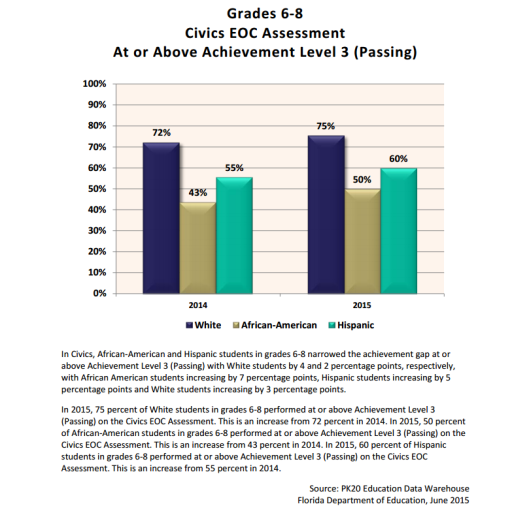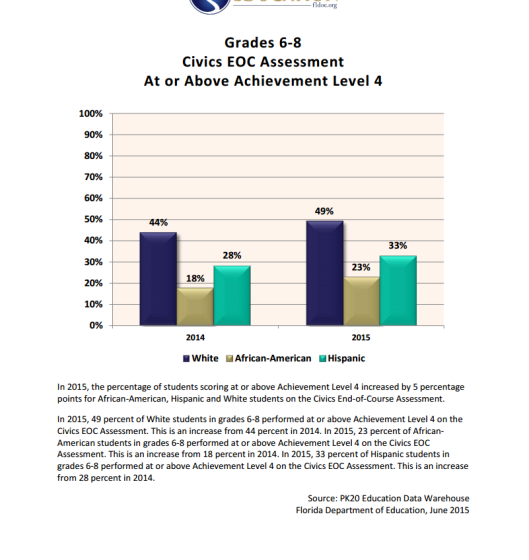Dear Friends in Civics and Colleagues in Citizenship, it pains me to have to do this post, but if you find the resources and professional development provided by the Florida Joint Center for Citizenship beneficial, then we are asking for your help.
As you may be aware, the Florida legislature has devolved into infighting over the state budget, with the Senate and the House significantly apart. In the Senate’s effort to create their own version of the budget, it has slashed funding for the Lou Frey Institute considerably (though our relatively small amount of funding is barely a blip in this battle). With the Lou Frey Institute essentially the funding source for the Florida Joint Center for Citizenship, this will have a major impact on our ability to help teachers, schools, and districts with civics instruction.
While the House has agreed to continue our recurring funding of $400,000 and to fund the Partnership for Civic Learning for another year, for a total budget request of less than one million dollars, the Senate has slashed that $400,000 for the Lou Frey Institute in half and eliminated PCL funding entirely. With the consistent hue and cry about civic education both in this state and nationally, this is incredibly disappointing. While the loss of the Partnership would be significant, especially as we have really jumped into researching what is working in civics education, the loss of such a huge a portion of our operating budget is even more devastating. We will be unable to provide professional development across the state, continue to develop new resources, or provide district support and trainings as requested in a variety of civics and social studies related areas. These are some of the things we are working on that will, unfortunately, face elimination:
- The development and implementation of a certificate program for pre-service teachers that prepares them for teaching civics in Florida. This has already been partially approved by UCF, and we were expecting to launch this in the spring of 2016.
- A partnership with the National Archives to develop resources for K-12 civics education in Florida. Most excitingly, there will be a heavy focus on ELEMENTARY resources.
- A partnership with all of the presidential libraries that will allow incredible access to resources for teachers in Florida
- Collaboration with districts on developing elementary resources. We already have work planned or underway with Palm Beach, Pinellas, and Miami, among others, and these resources would be made available to all districts in the state.
- Revisions to our online resources and website to improve ease of use and to keep up with teacher and student expectations. During the current school year the state’s approximately 2,000 civics teachers have logged on to access lessons and other Joint Center support materials more than 450,000 times.
- The development of new assessment items for our teacher bank and the Escambia site
- The return of a version of our Civics Mentor Teacher program, intended to launch in late September and currently on hold until our financial situation is clearer
- Reducation or elimination of support for the Escambia civics resources. Students and their parents have logged on to the Civics Review website more than 350,000 times.
- Professional development to districts across the state. FJCC has provided direct professional development to a third of the districts in the state in the past school year alone, and since 2008, FJCC has provided PD to almost 12,000 teachers.
This list does not include the research efforts that are ongoing through the work of the Partnership for Civic Learning.
If you are so inclined to live the civics that we teach every day, we ask, respectfully and only as a last resort, that you reach out to your state senators and our state senate leadership and ask them to restore the $200,000 removed from the Lou Frey Institute’s recurring funding request of $400,000. If you are feeling generous, ask them to include in the final budget an additional $250,000 – which was funded last year – to support the continuous outcome improvement efforts of the Partnership for Civic Learning. That appropriation request was made by Senator Detert and is included in the House budget.
Outside of your own local Senator (and House member if you choose), your message of support should be directed or CCed to:
Senator Don Gaetz
420 Senate Office Building
404 South Monroe Street
Tallahassee, FL 32399-1100
Tim.elwell@flsenate.gov
Senator Bill Montford
214 Senate Office Building
404 South Monroe Street
Tallahassee, FL 32399-1100
Marilyn.barnes@flsenate.gov
Senator Tom Lee
418 Senate Office Building
404 South Monroe Street
Tallahassee, FL 32399-1100
cindy.kynoch@flsenate.gov
Senator Lizbeth Benacquisto
326 Senate Office Building
404 South Monroe Street
Tallahassee, FL 32399-1100
Dane.bennett@flsenate.gov
President Andy Gardiner
409 The Capitol
404 South Monroe Street
Tallahassee, FL 32399-1100
Reynold.meyer@flsenate.gov
Senator Nancy C. Detert
416 Senate Office Building
404 South Monroe Street
Tallahassee, FL 32399-1100
charlie.anderson@flsenate.gov
If you choose to reach out to these folks in support of the Florida Joint Center for Citizenship, please be sure to refer to the funding for the Lou Frey Institute, as that is the budget item that supports us.
On behalf of everyone at the FJCC, we thank you deeply for any support that you are willing to provide.





